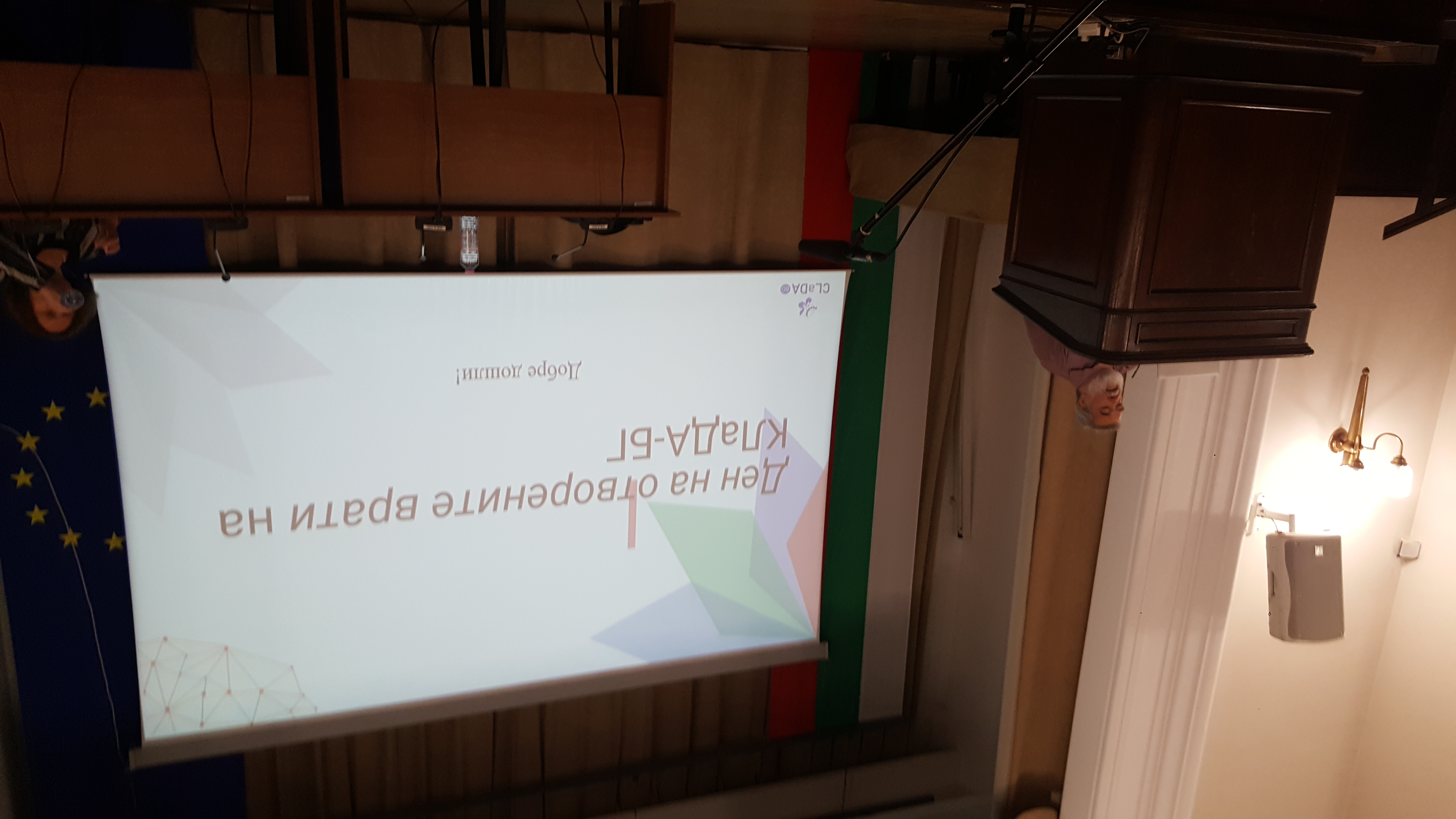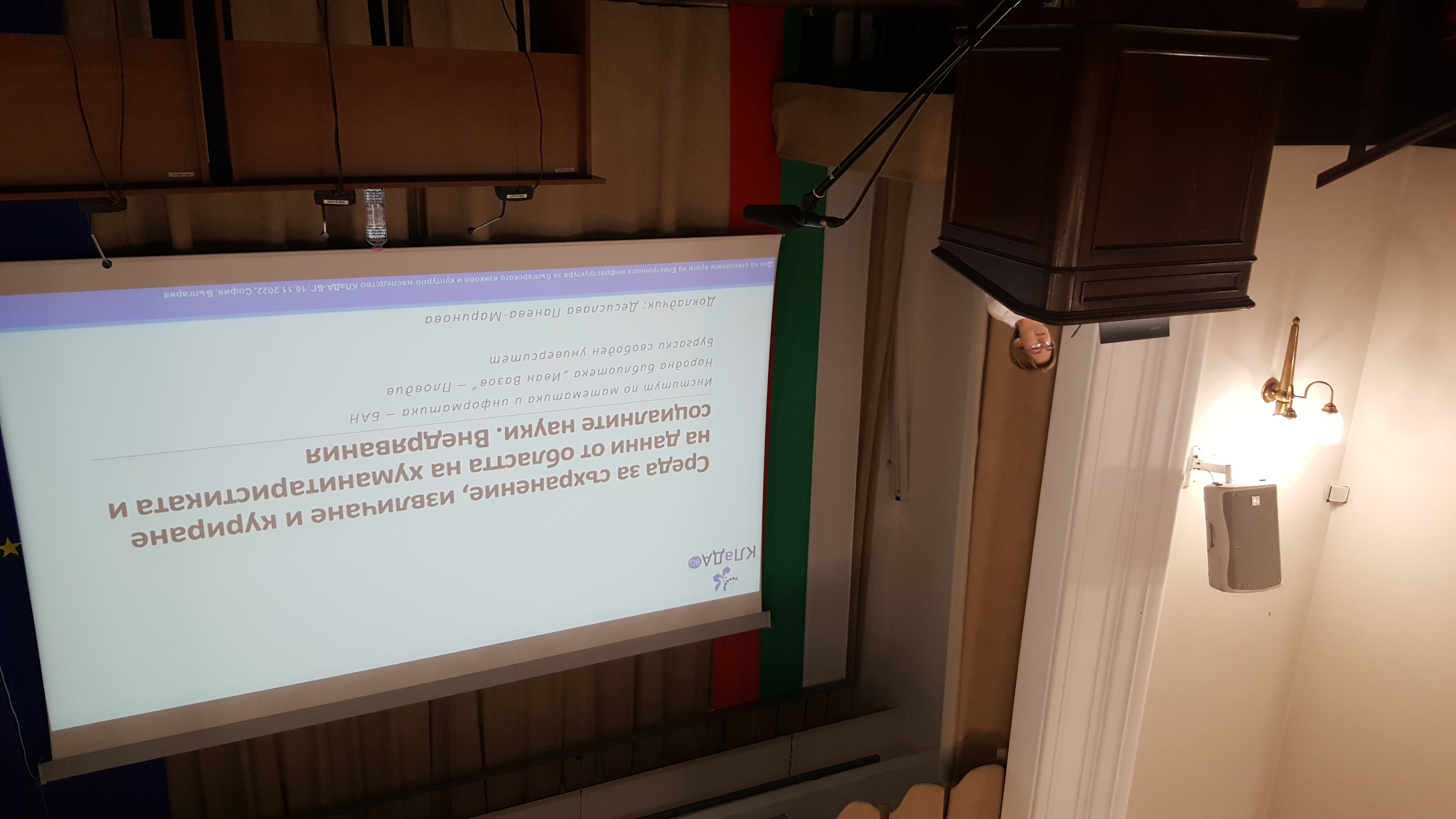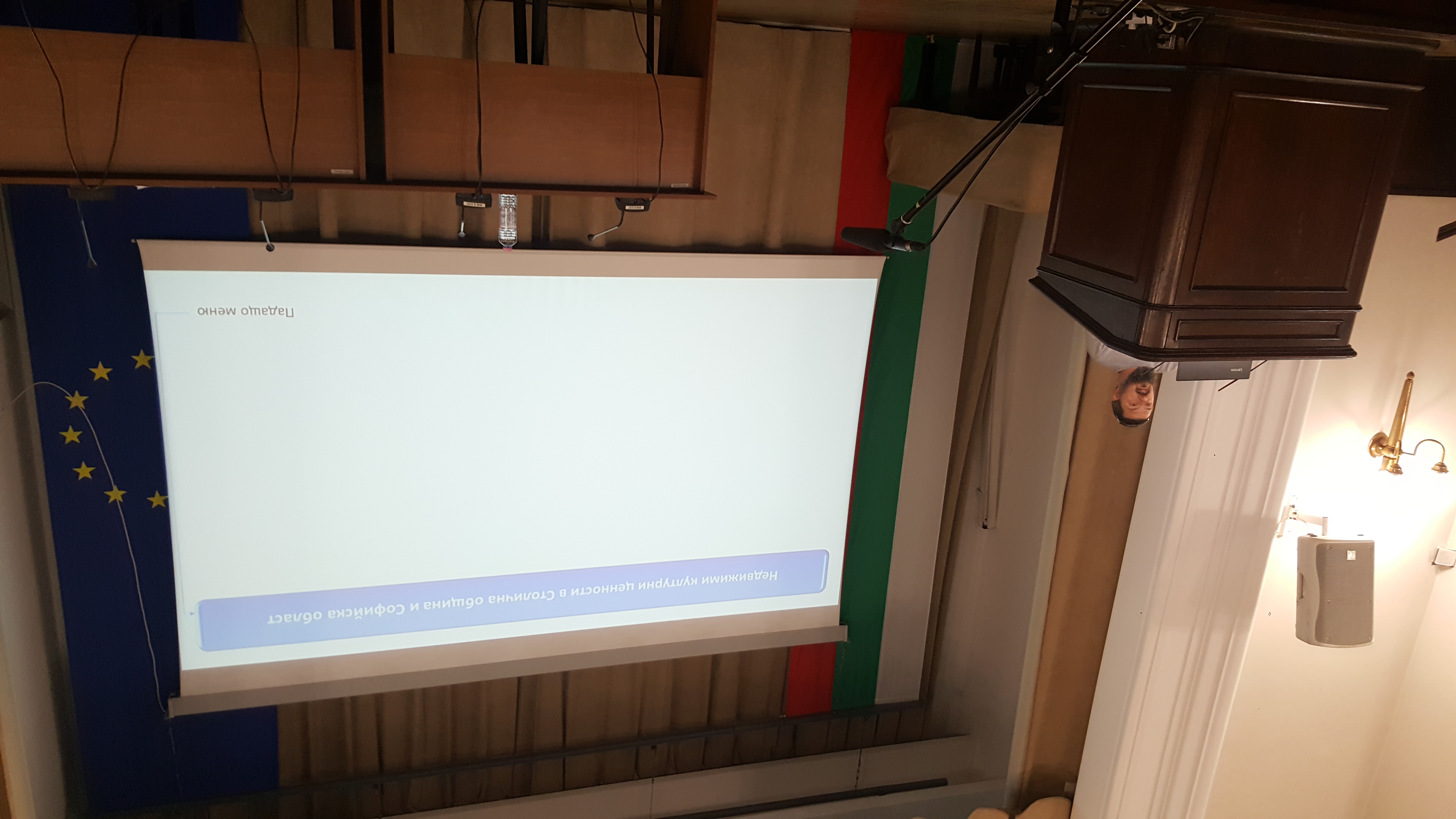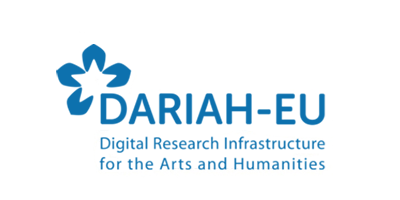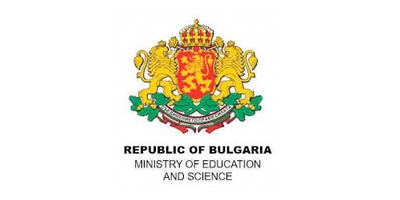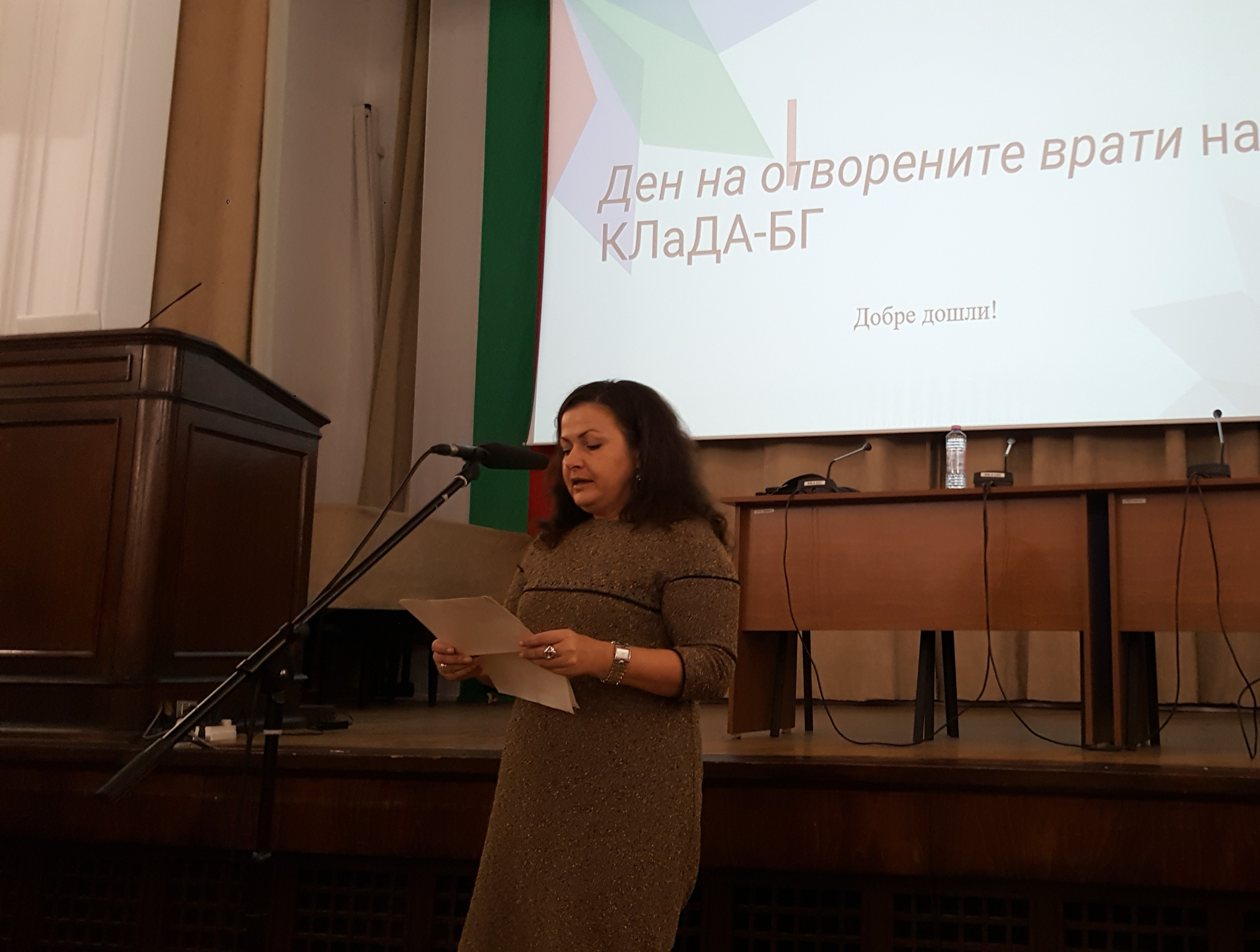
Open event of CLaDA-BG: National Interdisciplinary Research E-Infrastructure for Bulgarian Language and Cultural Heritage Resources and Technologies integrated within European CLARIN and DARIAH infrastructures
An Open event of CLaDA-BG was held on 16th November 2022 in “Prof. Marin Drinov” Hall, Central building of the Bulgarian Academy of Sciences. All partners of the CLaDA-BG consortium presented the results of their work in the infrastructure for the past four years of the preparation phase. A total of eighteen fifteen-minute presentations were given, and several question and discussion sessions took place.
The event was opened by Prof. Dr. habil Galya Angelova (Institute of Information and Communication Technologies, Bulgarian Academy of Sciences (IICT-BAS)), who welcomed the organizers, participants and guests, and expressed her satisfaction with the achieved results. After that Mrs. Milena Damyanova (director of Science Directorate, Ministry of Education and Science (MES)) gave her congratulations and expressed gratitude for the work done, and Assoc. Prof. Dr. Georgi Valchev (vice-rector of Sofia University “Saint Kliment Ohridski” (SU)) read greetings on behalf of Prof. Dr. habil Anastas Gerdzhikov (rector of SU). The event was attended by experts from the Science Directorate of MES, representatives of CLaDA-BG from BAS - Institute of Information and Communication Technologies, Institute of Mathematics and Informatics (IMI), Institute of Balkan Studies with Center of Thracology (IBSCT), Cyrillo-Methodian Research Center (CMRC), Institute of Ethnology and Folklore Studies with Ethnographic Museum (IEFSEM), also by representatives, academics and students from the Faculty of Slavic Studies (FSS) and the Faculty of Classical and Modern Philology (FCMP) in SU as well as from the Shumen University “Episkop Konstantin Preslavski” (Shumen University) and by colleagues from the Regional History Museum - Sofia (RHM-Sofia) and the National Library "Ivan Vazov", Plovdiv (NLIV Plovdiv).
The presentations were divided into three sessions:
1. Demo Session: Presentation of Software and Services
The session was opened with a brief presentation of the infrastructure CLaDA-BG by Prof. Dr. Kiril Simov. He gave the first report of IICT-BAS about the electronic language resource All about words, which combines semantic, morphological, etymological and terminological information, and also about Bulgarian grammar exercises generated from the available language resources. Prof. Dr. Velka Popova from Shumen University showed the resources, developed in the Language Lab LABLING. These are the corpus of child speech CHILDES for Bulgarian, the web-based system for presentation and research of verbal associations LABLASS and ready to use associative dictionaries. Assoc. Prof. Dr. Dimitar Iliev from SU gave a presentation about the digital collection of epigraphic monuments and the electronic edition of the chronicles of the Plovdiv Metropolis, which were developed through cooperation among the various institutions. Prof. Dr. Desislava Paneva-Marinova spoke about the collaborative work of IMI-BAS, the Burgas Free University and NLIV Plovdiv on the integration in the domain of humanities and social sciences. Assoc. Prof. Dr. Ivan Georgiev presented a report about the applications of the 3D technologies and the opportunities that they provide for the presentation of movable and immovable cultural heritage in Bulgaria. Representatives from the IBSCT-BAS projected their film Dig in the Balkans, which demonstrated the results from the process of digitisation of the archive and the library resources of the Institute, and also presented the initiative about creating video lectures with English subtitles with the aim of popularizing Bulgarian history and cultural heritage. The last presentation of the session was from Ontotext Company and it was about the development of the Bulgarian knowledge graph. One application is the service for word and phrase (n-gram) search in the Bulgarian webcorpus (WebCo-BG), and the other is the possibility for presenting data from the internet, corpora and collections with enriched content (semantic and morphological information), which gives the opportunity for extracting relations among people, locations and organizations.
2. Session for Technologies and Resources of CLaDA-BG
Prof. Dr. Kiril Simov summarized the current status of the technology infrastructure of CLaDA-BG and presented the knowledge graph developed in IICT-BAS. IMI-BAS presented the technological aspects of their environment for preservation, extraction and curation of data from the humanities and the social sciences. The report of SU was related to the development of electronic dictionaries and with applications for text and code processing. The presentation of IBSCT-BAS was about resources, expertise and perspectives for the digitization of knowledge for the Balkans, and the team showed its work in cooperation with RHM-Sofia - the digital passport of the Shavkulovi family house.
3. Session for Resources: Collections, E-books, Artifacts
NLIV Plovdiv presented the structure of the developed digital library in which books, periodical, graphic and cartography editions and archives are available. Prof. Dr. Veselka Zhelyazkova from the CMRC-BAS demonstrated the large set of digitized manuscripts, microfilms and important editions and research, which the institution owns. RHM-Sofia presented a short movie about the ways in which cultural heritage could be digitally and interactively popularized. IEFSEM-BAS gave a report about their work, which includes digitisation and description of their collections, and they emphasized on the importance of infrastructures like CLaDA-BG, which supports both the preservation of our national heritage and the provision of accessibility for the general public.
The program concluded with a discussion, moderated by Prof. Dr. Petya Osenova, during which Assoc. Prof. Dr. Dimitar Iliev, Prof. Dr. Desislava Paneva-Marinova, Prof. Dr. Kiril Simov and Assoc. Prof. Dr. habil Yura Konstantinova commented on the role of infrastructures in the domain of humanities and social sciences, and the advantages of open science as a science of the future. Some of the raised questions were: what the criteria for the inclusion of different collections in the CLaDA-BG repository should be - technical, ethical, legal, etc.; how could the integrated resources support not only research, but also teachers; what is the interaction between the infrastructures, science programs and science projects.
All the participants of CLaDA-BG presented posters. In the breaks between the sessions demonstrations from IICT-BAS and FCMP-SU took place. Among the demonstrations were: the system for integrated language resources by the Department of Artificial Intelligence and Language Technologies (IICT-BAS); virtual tour with virtual reality glasses by the Department of Scientific Computations with Laboratory on 3D Digitization and Microstructure Analysis (IICT-BAS), and demonstration of digital collections of epigraphic monuments (FCMP-SU). This event gave an opportunity for a dialog between the audience and the infrastructure participants as well as for a more detailed presentation of the work.


